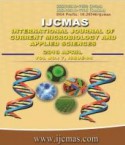


 National Academy of Agricultural Sciences (NAAS)
National Academy of Agricultural Sciences (NAAS)

|
PRINT ISSN : 2319-7692
Online ISSN : 2319-7706 Issues : 12 per year Publisher : Excellent Publishers Email : editorijcmas@gmail.com / submit@ijcmas.com Editor-in-chief: Dr.M.Prakash Index Copernicus ICV 2018: 95.39 NAAS RATING 2020: 5.38 |
Rice production has an important role in Indian economy and transplanting being most common practice adopted in the country. Transplanted rice encounters diverse type of weed flora consisting of grasses, sedges and broad-leafed weeds as well as sedges. Effective control of these weeds at initial stages can ensure in increasing the productivity of this crop. Weed control in transplanted rice by mechanical and cultural methods is quiet expensive. At peak period of crop weed competition due to labour crises weeding gets delayed. In contrast use of herbicides is an effective measure for weed control in transplanted rice. In India, the widely used herbicides are butachlor, anilofos, thiobencarb and pretilachlor, which provide effective control of annual grasses when applied as pre-emergence. However, these are not effective against annual sedges and broad leaf weeds. Further, due to continuous use of these herbicides a shift in weed flora from grassy to non-grassy and annual sedges has been observed in transplanted rice fields. Therefore, to overcome such problems, adoption of integrated weed management practices is a powerful tool, which can manage the weeds in standing crop more effectively in a sustainable way.
 |
 |
 |
 |
 |